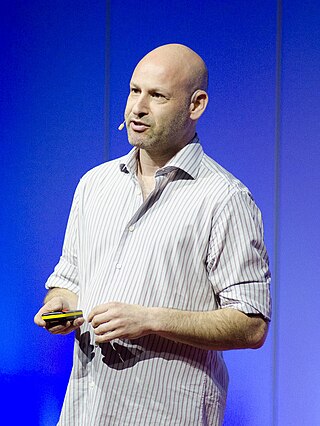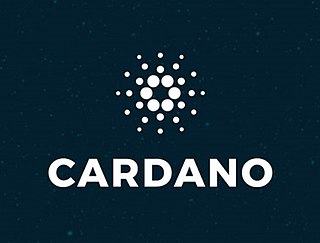
Akinyele Umoja is an American educator and author who specializes in African-American studies. As an activist, he is a founding member of the New Afrikan People's Organization and the Malcolm X Grassroots Movement. In April 2013, New York University Press published Umoja's book We Will Shoot Back: Armed Resistance in the Mississippi Freedom Movement. Currently, he is a Professor and Department Chair of the Department of African-American Studies at Georgia State University (GSU).

Ethereum is a decentralized blockchain with smart contract functionality. Ether is the native cryptocurrency of the platform. Among cryptocurrencies, ether is second only to bitcoin in market capitalization. It is open-source software.
A blockchain is a distributed ledger with growing lists of records (blocks) that are securely linked together via cryptographic hashes. Each block contains a cryptographic hash of the previous block, a timestamp, and transaction data. Since each block contains information about the previous block, they effectively form a chain, with each additional block linking to the ones before it. Consequently, blockchain transactions are irreversible in that, once they are recorded, the data in any given block cannot be altered retroactively without altering all subsequent blocks.
"Fintech", a clipped compound of "financial technology", refers to the application of innovative technologies to products and services in the financial industry. This broad term encompasses a wide array of technological advancements in financial services, including mobile banking, online lending platforms, digital payment systems, robo-advisors, and blockchain-based applications such as cryptocurrencies. Fintech companies include both startups and established technology and financial firms that aim to improve, complement, or replace traditional financial services.

The BitGive Foundation is an American nonprofit organization that solicits bitcoin donations for use in charitable causes.
Veem, formerly Align Commerce, is a San Francisco–based online global payments platform founded in 2014 by Marwan Forzley and Aldo Carrascoso. The company uses a payment routing method they refer to as "multi-rail technology," where transactions are routed through different methods, or "rails", such as credit cards, checks, or cryptocurrency.
Marc P. Bernegger is a Swiss-based web entrepreneur and Fintech investor. He is known for founding Amiando. He is also known as an advocate of entrepreneurship, FinTech and cryptocurrency in Switzerland.
Hyperledger is an umbrella project of open source blockchains and related tools that the Linux Foundation started in December 2015. IBM, Intel, and SAP Ariba have contributed to support the collaborative development of blockchain-based distributed ledgers. It was renamed the Hyperledger Foundation in October 2021.

Joseph Lubin is a Canadian-American businessman. He has founded and co-founded several companies, including the Swiss-based EthSuisse, contributing heavily to Ethereum, the decentralized cryptocurrency platform. Lubin is the founder of ConsenSys, a Brooklyn-based software production studio.
Consensys is a private blockchain software technology company founded by Joseph Lubin and based in Fort Worth.
The Cambridge Centre for Alternative Finance was established in 2015, and is a part of the Cambridge Judge Business School, University of Cambridge. The Centre is a research and education institute focused on researching technology-enabled financial innovation and its interplay with policy, regulation, supervision and infrastructure.

Cardano is a public blockchain platform. It is open-source and decentralized, with consensus achieved using proof of stake. It can facilitate peer-to-peer transactions with its internal cryptocurrency, ADA.
Bitwala is a blockchain banking service, headquartered in Berlin, Germany, that was founded by Jörg von Minckwitz, Jan Goslicki, and Benjamin P. Jones in October 2015.
EOS.IO is a blockchain protocol based on the cryptocurrency EOS. The smart contract platform claims to eliminate transaction fees and also conduct millions of transactions per second. It was developed by the private company Block.one and launched in 2017. The platform was later released as open-source software.
The Decree No. 8 ‘On the Development of Digital Economy’ is a presidential decree in Belarus that created favourable legal conditions for the IT sector, stimulating the inflow of international investments and local startups development. The idea of the document was proposed and formulated by the High-Tech Park, a core organization in Belarusian IT. The Decree was signed on 21 December 2017, and came in force on 28 March 2018. Decree No. 8 adopted the widespread institutions of UK law like convertible bonds and non-compete agreements, but also has preserved some features of continental law based on the principles of good faith and reasonableness, thus creating a favourable environment for starting and running a business.
Diem was a permissioned blockchain-based stablecoin payment system proposed by the American social media company Facebook. The plan also included a private currency implemented as a cryptocurrency.

Amanda Claire Cassatt is an American entrepreneur, marketing executive and author. She was also the chief marketing officer at ConsenSys from 2016 until July 2019. Cassatt is the founder and CEO of Serotonin, a Web3 services company.
Decentralized finance provides financial instruments and services through smart contracts on a programmable, permissionless blockchain. This approach reduces the need for intermediaries such as brokerages, exchanges, or banks. DeFi platforms enable users to lend or borrow funds, speculate on asset price movements using derivatives, trade cryptocurrencies, insure against risks, and earn interest in savings-like accounts. The DeFi ecosystem is built on a layered architecture and highly composable building blocks. While some applications offer high interest rates, they carry high risks. Coding errors and hacks are a common challenge in DeFi.

MetaMask is a software cryptocurrency wallet used to interact with the Ethereum blockchain. It allows a user to access their Ethereum wallet through a browser extension or mobile app, which can then be used to interact with decentralized applications. MetaMask is developed by Consensys, a blockchain software company focusing on Ethereum-based tools and infrastructure.







